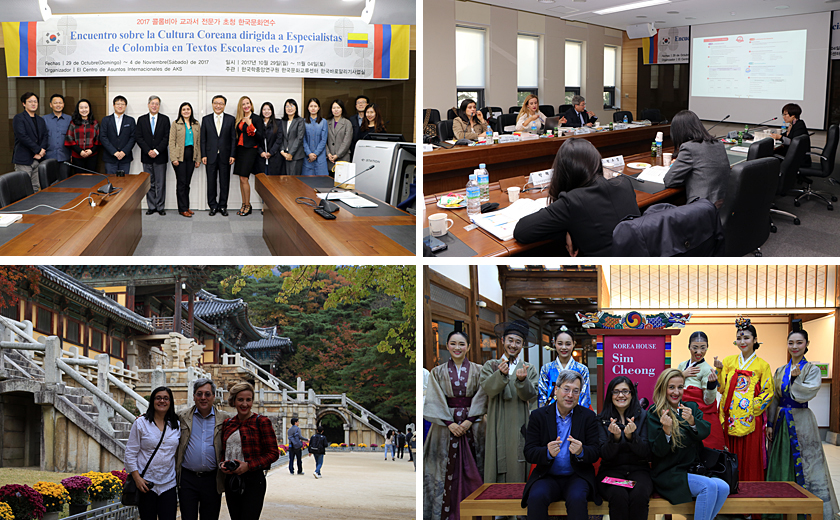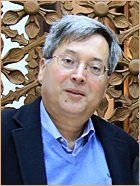Column
2017 Fellowship for Textbook Specialists of Colombia
New vision for Korea
The visit to South Korea with the AKS program for textbook specialists, in this case from Colombia, has been an exceptional personal and professional experience. My knowledge of South Korea was limited; my first contact with the country was in 1991 when I worked as an editor (at that time in Editorial Norma) and I was in charge of the translation and Spanish edition of a book by Alice H. Amsden entitled, “South Korea: A Late Industrialization Process”. I then had contact with the publishing house Yewon Media while I was in Santillana, Mexico as Director of Children's and Young People's Literature, from whom we bought rights to a Spanish language version of some of their collections of information books for children. Finally, since 2010, when I was put in charge of the management of educational innovative projects in Santillana, Colombia, information on Korea and Korean education has been linked to the results of the Pisa tests and McKinsey's reports, based on what Korea has done to achieve excellent results.
Nevertheless, my knowledge about this nation was limited. My visit has given me knowledge and awareness of the culture in a broad sense, a 360-degree view of the history and reality of South Korea. Specifically, it not only provided me with an understanding of Korea in an abstract sense, but also gave the chance to experience the food, geography, cultural and religious expressions, history and archaeology, organization and respect for their own history and their future, the reality of the technological progress and infrastructure development, and the warmth, generosity, sophistication, and means of relating and living of the Korean people.
The first part of the visit at AKS’s headquarters allowed me to experience life in the academy dormitories and to have the opportunity to listen to sessions on education, economics, contemporary history and vision of the country in school textbooks from different countries, at a very high academic level, and at the same time with a professionalism and simplicity that amazed me and made it extremely clear how Korea has been able to become a developed country, a powerful economy capable of assimilating its transformation by carefully looking after its population and achieving a level and quality of life respecting their traditions and history. I was struck by the seriousness and formality with which the AKS organized the seminar, the relevance and importance given to the seminar. An impressive library with school texts from different countries of the world! The visit to the archives was a chapter unto itself, showing us the wealth of cultural heritage that Korea cares for, including the tour of the museum guided by the curator, who was very young but with an admirable knowledge and control of the exhibition.
We had a broad, varied, and highly sophisticated gastronomic experience which gave me the opportunity to get to know and taste the diversity of flavours and cooking techniques, taking advantage of the peninsula's food resources and learning to explore flavours which were unknown to me. The reception lunch was actually an exquisite banquet, with very warm company where I felt enormously honoured and welcome. This food experience in Korea was constant throughout the whole trip. Each meal was carefully chosen, extremely varied, and pleasantly, always Korean. I was able to experience Korea’s rooted sense to share food, giving me an understanding of their ways of being.
The timing of the invitation could not have been better, an autumn which allowed us to see how the season is in terms of vegetation, temperature, and colour. The trips allowed us to see the Korean geography thoroughly.
The tour through historic sites, the cave of Gwangmyeong and Ori Seowon, was a first rapprochement stage to other aspects of the country, and then the fast train ride to Gyeongju was an experience of comfort and enjoyment of the landscape.
The city of Gyeongju is amazing both in terms of the archaeological and historical relics and the hotel and tourist infrastructure. The visit to the Buddhist temples and the ancient Korean village completed my newfound perception and knowledge of the country. It reveals with a single stroke the past and present of the country, the dimension of its religious and political history, and the means of social and economic organization.
Then Seoul, a cosmopolitan city which is modern and at the same time strewn with historical relics, and the visit to the theatre was again a wonderful surprise; on several occasions we could see how the different cultural manifestations have managed to fuse traditional representations with the artistic use of the technology, as was the case with the theatrical performance we saw.
Moreover, the company and ever-present guidance of Diana, the visit organizer, as well as Melina, the interpreter, made the trip an extraordinary week – motivation to explore much more about that country.
Apart from the materials on Korea which are extremely useful and practical, I have obtained a completely new vision of South Korea, which is definitely worth visiting and is worth the effort to spread said vision in our country. There is much that could be learnt from South Korea: the determination of a country to build a prosperous future and to improve the quality of life of the Korean people while preserving, knowing and clearly maintaining the identity of Korea’s history and past.
Nevertheless, my knowledge about this nation was limited. My visit has given me knowledge and awareness of the culture in a broad sense, a 360-degree view of the history and reality of South Korea. Specifically, it not only provided me with an understanding of Korea in an abstract sense, but also gave the chance to experience the food, geography, cultural and religious expressions, history and archaeology, organization and respect for their own history and their future, the reality of the technological progress and infrastructure development, and the warmth, generosity, sophistication, and means of relating and living of the Korean people.
The first part of the visit at AKS’s headquarters allowed me to experience life in the academy dormitories and to have the opportunity to listen to sessions on education, economics, contemporary history and vision of the country in school textbooks from different countries, at a very high academic level, and at the same time with a professionalism and simplicity that amazed me and made it extremely clear how Korea has been able to become a developed country, a powerful economy capable of assimilating its transformation by carefully looking after its population and achieving a level and quality of life respecting their traditions and history. I was struck by the seriousness and formality with which the AKS organized the seminar, the relevance and importance given to the seminar. An impressive library with school texts from different countries of the world! The visit to the archives was a chapter unto itself, showing us the wealth of cultural heritage that Korea cares for, including the tour of the museum guided by the curator, who was very young but with an admirable knowledge and control of the exhibition.
We had a broad, varied, and highly sophisticated gastronomic experience which gave me the opportunity to get to know and taste the diversity of flavours and cooking techniques, taking advantage of the peninsula's food resources and learning to explore flavours which were unknown to me. The reception lunch was actually an exquisite banquet, with very warm company where I felt enormously honoured and welcome. This food experience in Korea was constant throughout the whole trip. Each meal was carefully chosen, extremely varied, and pleasantly, always Korean. I was able to experience Korea’s rooted sense to share food, giving me an understanding of their ways of being.
The timing of the invitation could not have been better, an autumn which allowed us to see how the season is in terms of vegetation, temperature, and colour. The trips allowed us to see the Korean geography thoroughly.
The tour through historic sites, the cave of Gwangmyeong and Ori Seowon, was a first rapprochement stage to other aspects of the country, and then the fast train ride to Gyeongju was an experience of comfort and enjoyment of the landscape.
The city of Gyeongju is amazing both in terms of the archaeological and historical relics and the hotel and tourist infrastructure. The visit to the Buddhist temples and the ancient Korean village completed my newfound perception and knowledge of the country. It reveals with a single stroke the past and present of the country, the dimension of its religious and political history, and the means of social and economic organization.
Then Seoul, a cosmopolitan city which is modern and at the same time strewn with historical relics, and the visit to the theatre was again a wonderful surprise; on several occasions we could see how the different cultural manifestations have managed to fuse traditional representations with the artistic use of the technology, as was the case with the theatrical performance we saw.
Moreover, the company and ever-present guidance of Diana, the visit organizer, as well as Melina, the interpreter, made the trip an extraordinary week – motivation to explore much more about that country.
Apart from the materials on Korea which are extremely useful and practical, I have obtained a completely new vision of South Korea, which is definitely worth visiting and is worth the effort to spread said vision in our country. There is much that could be learnt from South Korea: the determination of a country to build a prosperous future and to improve the quality of life of the Korean people while preserving, knowing and clearly maintaining the identity of Korea’s history and past.



